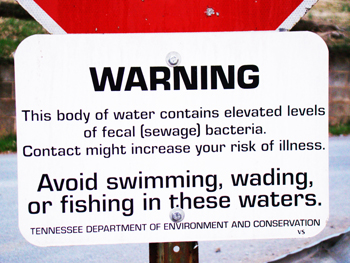In Tennessee, where typical daytime summer temperatures are locked in the high 80s and above, “about 176 river miles are posted due to bacterial contamination,” warns the state’s Department of Environment and Conservation (DEC).
 Causes of the contamination are “pathogen sources include failing septic tanks, collection system failure, failing animal waste systems, or urban runoff,” according to the most recent DEC reporting, which has remained unchanged since April.
Causes of the contamination are “pathogen sources include failing septic tanks, collection system failure, failing animal waste systems, or urban runoff,” according to the most recent DEC reporting, which has remained unchanged since April.
The warning includes 20 miles of Beaver Creek, a favorite paddling and swimming destination in northeast Tennessee that has suffered chronic contamination problems for years. Reported TriCities.com on August 10, 2011:
On a hot summer day, the waters of Beaver Creek and its streams and tributaries – which cut a 20-mile path from the Virginia-Tennessee line to Boone Lake — might tempt those looking for a great place to splash around and cool off. . . State environmental officials warn that these waters could also be a great place to come into contact with Escherichia coli – a potentially fatal strain of bacteria
. . . Eighteen people in Northeast Tennessee and Southwest Virginia were diagnosed with E. coli infections between May 8 and June 11, including Gabby Blair, a 2-year-old girl from Dryden, Va., who died June 5 after she was rushed to Johnson City Medical Center’s Pediatric Intensive Care Unit with HUS [hemolytic uremic syndrome].
According to the National Institutes of Health, HUS, a disease that destroys red blood cells and is the most common cause of sudden, short-term—acute—kidney failure in children:
. . . develops when Escherichia coli (E. coli) bacteria lodged in the digestive tract make toxins that enter the bloodstream and start to destroy red blood cells. Most cases of HUS occur after an infection of the digestive tract by the E. colibacterium, which is found in foods like meat, dairy products, and juice when they are contaminated. Some people have contracted HUS after swimming in pools or lakes contaminated with feces.
The United States Environmental Protection Agency does not include Tennessee in its online national listing of swimming beach advisories which is limited to only coastal or Great Lakes states.
For more information on the Clean Water Act’s failed July 1, 1983 policy goal regarding water and recreation: EarthDesk July 1, 2014 and EarthDesk July 1, 2013.









